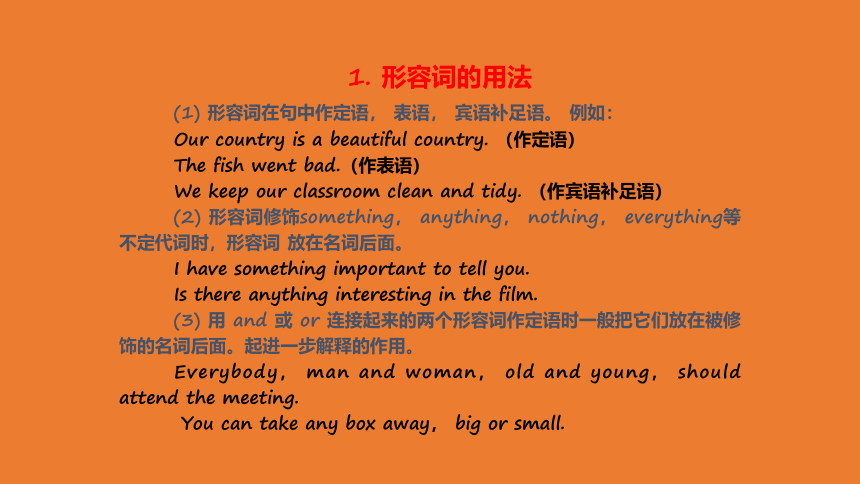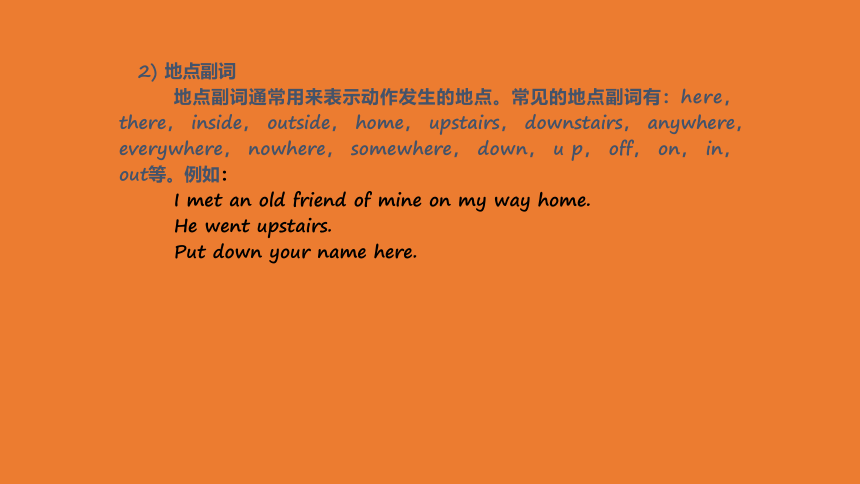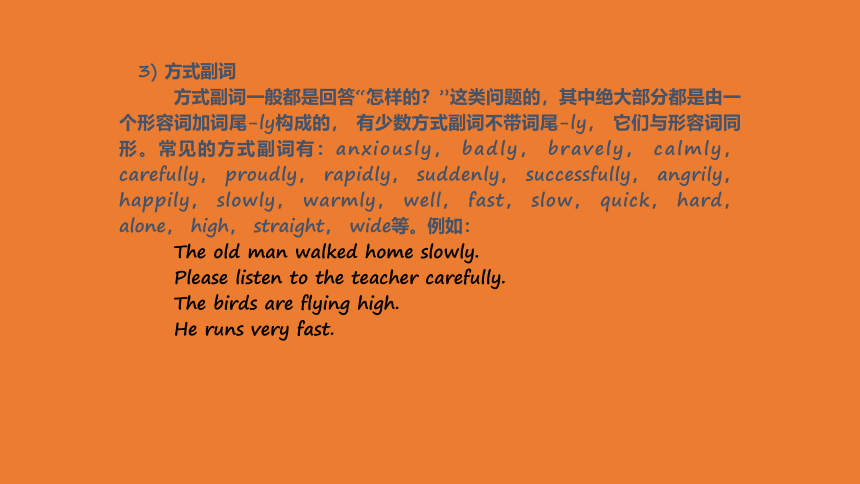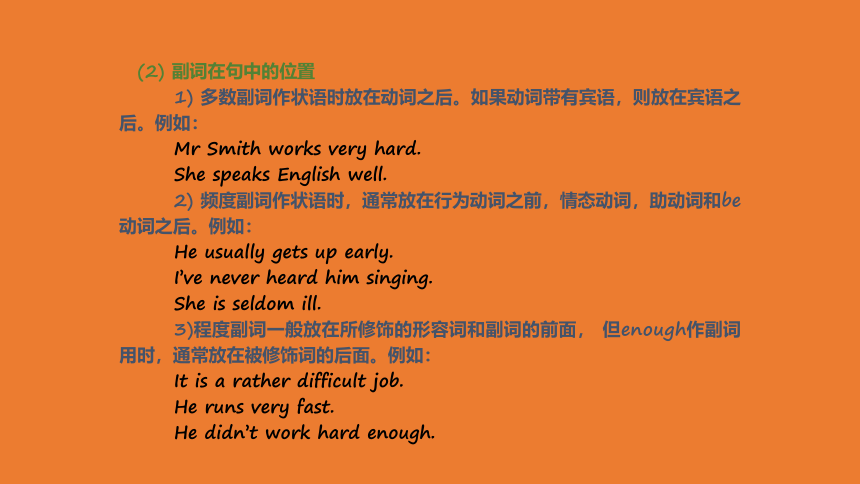2023届高三英语二轮复习:形容词和副词 课件(15张)
文档属性
| 名称 | 2023届高三英语二轮复习:形容词和副词 课件(15张) |  | |
| 格式 | pptx | ||
| 文件大小 | 3.1MB | ||
| 资源类型 | 教案 | ||
| 版本资源 | 通用版 | ||
| 科目 | 英语 | ||
| 更新时间 | 2022-10-03 21:36:40 | ||
图片预览







文档简介
(共15张PPT)
解析形容词和副词
1. 形容词的用法
(1) 形容词在句中作定语, 表语, 宾语补足语。 例如:
Our country is a beautiful country. (作定语)
The fish went bad.(作表语)
We keep our classroom clean and tidy. (作宾语补足语)
(2) 形容词修饰something, anything, nothing, everything等不定代词时,形容词 放在名词后面。
I have something important to tell you.
Is there anything interesting in the film.
(3) 用 and 或 or 连接起来的两个形容词作定语时一般把它们放在被修饰的名词后面。起进一步解释的作用。
Everybody, man and woman, old and young, should attend the meeting.
You can take any box away, big or small.
(4) the+形容词表示一类人或物
The rich should help the poor.
2. 副词的用法
(1) 副词在句中可作状语,表语和定语。
He studies very hard.(作状语)
Life here is full of joy.(作定语)
When will you be back (作表语)
副词按其用途和含义 可分为下面五类:
1) 时间副词
时间副词通常用来表示动作的时间。常见的时间副词有:now today, tomorrow, yesterday, before, late, early, never, seldom, sometimes , often, usually, always等。例如:
He often comes to school late.
What are we going to do tomorrow
He is never been to Beijing.
2) 地点副词
地点副词通常用来表示动作发生的地点。常见的地点副词有:here, there, inside, outside, home, upstairs, downstairs, anywhere, everywhere, nowhere, somewhere, down, u p, off, on, in, out等。例如:
I met an old friend of mine on my way home.
He went upstairs.
Put down your name here.
3) 方式副词
方式副词一般都是回答“怎样的?”这类问题的,其中绝大部分都是由一个形容词加词尾-ly构成的, 有少数方式副词不带词尾-ly, 它们与形容词同形。常见的方式副词有:anxiously, badly, bravely, calmly, carefully, proudly, rapidly, suddenly, successfully, angrily, happily, slowly, warmly, well, fast, slow, quick, hard, alone, high, straight, wide等。例如:
The old man walked home slowly.
Please listen to the teacher carefully.
The birds are flying high.
He runs very fast.
4) 程度副词
程度副词多数用来修饰形容词和副词,有少数用来修饰动词或介词短语。常见的程度副词有:much, (a) little, a bit, very, so, too, enough, quite, rather, pretty, greatly, completely, nearly, almost, deeply, hardly, partly等。例如:
Her pronunciation is very good.
She sings quite well.
I can hardly agree with you.
5) 疑问副词是用来引导特殊疑问句的副词。常见的疑问副词有:how, when, where, why等。例如:
How are you getting along with your studies
Where were you yesterday
Why did you do that
(2) 副词在句中的位置
1) 多数副词作状语时放在动词之后。如果动词带有宾语,则放在宾语之后。例如:
Mr Smith works very hard.
She speaks English well.
2) 频度副词作状语时,通常放在行为动词之前,情态动词,助动词和be动词之后。例如:
He usually gets up early.
I’ve never heard him singing.
She is seldom ill.
3)程度副词一般放在所修饰的形容词和副词的前面, 但enough作副词用时,通常放在被修饰词的后面。例如:
It is a rather difficult job.
He runs very fast.
He didn’t work hard enough.
4)副词作定语时,一般放在被修饰的名词之后。例如:
On my way home, I met my uncle.
The students there have a lot time to do their own research work.
( 3) 部分常用副词的用法
1) very, much
这两个副词都可表示“很”,但用法不同。Very用来修饰形容词和副词的原级,而much用来修饰形容词和副词的比较级。例如:
She is a very nice girl
I’m feeling much better now.
Much可以修饰动词,而very则不能。例如:
I don’t like the idea much.
They did not talk much.
2) too, either
这两个副词都表示“也”,但too用于肯定句,either用于否定句。例如:
She can dance, and I can dance, too.
I haven’t read the book and my brother hasn’t either.
3) already, yet
already一般用于语肯定句,yet一般用于否定句。例如:
He has already left.
Have you heard from him yet
He hasn’t answered yet.
4) so, neither
so和neither都可用于倒装句, 但so表示肯定,neither表示否定。例如:
My brother likes football and so do I.
My brother doesn’t like dancing and neither do I.
4. 形容词和副词的比较级和最高级
(1) 两个人或事物的比较时(不一定每一方只有一个人或一个事物),用比较级。
Our teacher is taller than we are.
The boys in her class are taller than the boys in your class.
(2) most 同形容词连用而不用 the,表示 ”极,很,非常, 十分”。
It‘s most dangerous to be here.
在这儿太危险。
(3)“The+形容词比较级..., the+形容词比较级...”表示“越... 就越...”。
The more you study, the more you know.
(4) “形容 词比较级 + and + 形容词比较级”, 表示 “ 越来越...”。
It‘s getting hotter and hotter.
(5) 主语+谓语(系动词)+as+形容词原形+as+从句。表示两者对比相同。
This box is as big as mine.
(6) the + 形容词,表示某种人。
He always helps the poor.
(7) 形容词和副词最高级用于三个或三个以上的人和物进行比较。
Shanghai is one of the biggest cities in China.
1.There are many young trees onsides of the ______ road.
A. every B. each C. both D. all
2.--- It’s so cold today.
-- Yes, it’s ______ than it was yesterday.
A. more cold B. more colder C. much colder D. cold
3.Little Tom has ______ friends, so he often plays alone.
A. more B. a little C. many D. few
4.She isn’t so ______ at maths as you are.
A. well B. good C. better D. best
5.Peter writes _______ of the three.
A. better B. best C. good D. well
【演练】
1.C
2.C
3.D
4.B
5.B
6.He is ______ enough to carry the heavy box.
A. stronger B. much stronger C. strong D. the strongest
7.I bought _____ exercise-books with ______ money.
A. a few; a few B. a few; a little
C. a little; a few D. a little; a little
8.The box is ____ heavy for the girl ____ carry.
A. too; to B. to; too C. so; that D. no; to
9.The ice in the lake is about one meter _____. It’s strong enough to skate on.
A. long B. high C. thick D. wide
10.Wu Lin ran ______ faster than the other boys in the sports meeting.
A. so B. much C. very D. too
【演练】
6.C
7.B
8.A
9.C
10.B
11. Jone looks so _______ today because she has got an “A” in her maths test.
A. happy B. happily C. angry D. angrily
12. The smile on my father’s face showed that he was ______ with me.
A. sad B. pleased C. angry D. sorry
13. ---Mum, could you buy me a dress like this
---Certainly, we can buy ______ one than this, but ______ this.
A. a better; better than B. a worse; as good as
C. a cheaper; as good as D. a more important; good as
14. ---This digital camera is really cheap!
---The ______ the better. I’m short of money, you see.
A. cheap B. cheaper C. expensive D. more expensive
15. If you want to learn English well, you must use it as _______ as possible.
A. often B. long C. hard D. soon
【演练】
11.A
12.B
13.C
14.B
15.A
16.C
17.A
18.D
19.C
20.B
16. Paul has ______ friends except me, and sometimes he feels lonely.
A. many B. some C. few D. more
17. English people _____ use Mr. Before a man’s first name.
A. never B. usually C. often D. sometimes
18. ---One more satellite was sent up into space in China in May.
---Right. The government spoke ______ that.
A. highly for B. high of
C. well of D. highly of
19. ---Remember this, children. ______ careful you are, ______ mistakes you will make.
---We know,Miss Gao.
A. The more; the more B. The fewer; the more
C. The more; the fewer D. The less; the less
20. I have ________ to do today.
A. anything important B. something important
C. important nothing D. important something
【演练】
解析形容词和副词
1. 形容词的用法
(1) 形容词在句中作定语, 表语, 宾语补足语。 例如:
Our country is a beautiful country. (作定语)
The fish went bad.(作表语)
We keep our classroom clean and tidy. (作宾语补足语)
(2) 形容词修饰something, anything, nothing, everything等不定代词时,形容词 放在名词后面。
I have something important to tell you.
Is there anything interesting in the film.
(3) 用 and 或 or 连接起来的两个形容词作定语时一般把它们放在被修饰的名词后面。起进一步解释的作用。
Everybody, man and woman, old and young, should attend the meeting.
You can take any box away, big or small.
(4) the+形容词表示一类人或物
The rich should help the poor.
2. 副词的用法
(1) 副词在句中可作状语,表语和定语。
He studies very hard.(作状语)
Life here is full of joy.(作定语)
When will you be back (作表语)
副词按其用途和含义 可分为下面五类:
1) 时间副词
时间副词通常用来表示动作的时间。常见的时间副词有:now today, tomorrow, yesterday, before, late, early, never, seldom, sometimes , often, usually, always等。例如:
He often comes to school late.
What are we going to do tomorrow
He is never been to Beijing.
2) 地点副词
地点副词通常用来表示动作发生的地点。常见的地点副词有:here, there, inside, outside, home, upstairs, downstairs, anywhere, everywhere, nowhere, somewhere, down, u p, off, on, in, out等。例如:
I met an old friend of mine on my way home.
He went upstairs.
Put down your name here.
3) 方式副词
方式副词一般都是回答“怎样的?”这类问题的,其中绝大部分都是由一个形容词加词尾-ly构成的, 有少数方式副词不带词尾-ly, 它们与形容词同形。常见的方式副词有:anxiously, badly, bravely, calmly, carefully, proudly, rapidly, suddenly, successfully, angrily, happily, slowly, warmly, well, fast, slow, quick, hard, alone, high, straight, wide等。例如:
The old man walked home slowly.
Please listen to the teacher carefully.
The birds are flying high.
He runs very fast.
4) 程度副词
程度副词多数用来修饰形容词和副词,有少数用来修饰动词或介词短语。常见的程度副词有:much, (a) little, a bit, very, so, too, enough, quite, rather, pretty, greatly, completely, nearly, almost, deeply, hardly, partly等。例如:
Her pronunciation is very good.
She sings quite well.
I can hardly agree with you.
5) 疑问副词是用来引导特殊疑问句的副词。常见的疑问副词有:how, when, where, why等。例如:
How are you getting along with your studies
Where were you yesterday
Why did you do that
(2) 副词在句中的位置
1) 多数副词作状语时放在动词之后。如果动词带有宾语,则放在宾语之后。例如:
Mr Smith works very hard.
She speaks English well.
2) 频度副词作状语时,通常放在行为动词之前,情态动词,助动词和be动词之后。例如:
He usually gets up early.
I’ve never heard him singing.
She is seldom ill.
3)程度副词一般放在所修饰的形容词和副词的前面, 但enough作副词用时,通常放在被修饰词的后面。例如:
It is a rather difficult job.
He runs very fast.
He didn’t work hard enough.
4)副词作定语时,一般放在被修饰的名词之后。例如:
On my way home, I met my uncle.
The students there have a lot time to do their own research work.
( 3) 部分常用副词的用法
1) very, much
这两个副词都可表示“很”,但用法不同。Very用来修饰形容词和副词的原级,而much用来修饰形容词和副词的比较级。例如:
She is a very nice girl
I’m feeling much better now.
Much可以修饰动词,而very则不能。例如:
I don’t like the idea much.
They did not talk much.
2) too, either
这两个副词都表示“也”,但too用于肯定句,either用于否定句。例如:
She can dance, and I can dance, too.
I haven’t read the book and my brother hasn’t either.
3) already, yet
already一般用于语肯定句,yet一般用于否定句。例如:
He has already left.
Have you heard from him yet
He hasn’t answered yet.
4) so, neither
so和neither都可用于倒装句, 但so表示肯定,neither表示否定。例如:
My brother likes football and so do I.
My brother doesn’t like dancing and neither do I.
4. 形容词和副词的比较级和最高级
(1) 两个人或事物的比较时(不一定每一方只有一个人或一个事物),用比较级。
Our teacher is taller than we are.
The boys in her class are taller than the boys in your class.
(2) most 同形容词连用而不用 the,表示 ”极,很,非常, 十分”。
It‘s most dangerous to be here.
在这儿太危险。
(3)“The+形容词比较级..., the+形容词比较级...”表示“越... 就越...”。
The more you study, the more you know.
(4) “形容 词比较级 + and + 形容词比较级”, 表示 “ 越来越...”。
It‘s getting hotter and hotter.
(5) 主语+谓语(系动词)+as+形容词原形+as+从句。表示两者对比相同。
This box is as big as mine.
(6) the + 形容词,表示某种人。
He always helps the poor.
(7) 形容词和副词最高级用于三个或三个以上的人和物进行比较。
Shanghai is one of the biggest cities in China.
1.There are many young trees onsides of the ______ road.
A. every B. each C. both D. all
2.--- It’s so cold today.
-- Yes, it’s ______ than it was yesterday.
A. more cold B. more colder C. much colder D. cold
3.Little Tom has ______ friends, so he often plays alone.
A. more B. a little C. many D. few
4.She isn’t so ______ at maths as you are.
A. well B. good C. better D. best
5.Peter writes _______ of the three.
A. better B. best C. good D. well
【演练】
1.C
2.C
3.D
4.B
5.B
6.He is ______ enough to carry the heavy box.
A. stronger B. much stronger C. strong D. the strongest
7.I bought _____ exercise-books with ______ money.
A. a few; a few B. a few; a little
C. a little; a few D. a little; a little
8.The box is ____ heavy for the girl ____ carry.
A. too; to B. to; too C. so; that D. no; to
9.The ice in the lake is about one meter _____. It’s strong enough to skate on.
A. long B. high C. thick D. wide
10.Wu Lin ran ______ faster than the other boys in the sports meeting.
A. so B. much C. very D. too
【演练】
6.C
7.B
8.A
9.C
10.B
11. Jone looks so _______ today because she has got an “A” in her maths test.
A. happy B. happily C. angry D. angrily
12. The smile on my father’s face showed that he was ______ with me.
A. sad B. pleased C. angry D. sorry
13. ---Mum, could you buy me a dress like this
---Certainly, we can buy ______ one than this, but ______ this.
A. a better; better than B. a worse; as good as
C. a cheaper; as good as D. a more important; good as
14. ---This digital camera is really cheap!
---The ______ the better. I’m short of money, you see.
A. cheap B. cheaper C. expensive D. more expensive
15. If you want to learn English well, you must use it as _______ as possible.
A. often B. long C. hard D. soon
【演练】
11.A
12.B
13.C
14.B
15.A
16.C
17.A
18.D
19.C
20.B
16. Paul has ______ friends except me, and sometimes he feels lonely.
A. many B. some C. few D. more
17. English people _____ use Mr. Before a man’s first name.
A. never B. usually C. often D. sometimes
18. ---One more satellite was sent up into space in China in May.
---Right. The government spoke ______ that.
A. highly for B. high of
C. well of D. highly of
19. ---Remember this, children. ______ careful you are, ______ mistakes you will make.
---We know,Miss Gao.
A. The more; the more B. The fewer; the more
C. The more; the fewer D. The less; the less
20. I have ________ to do today.
A. anything important B. something important
C. important nothing D. important something
【演练】
